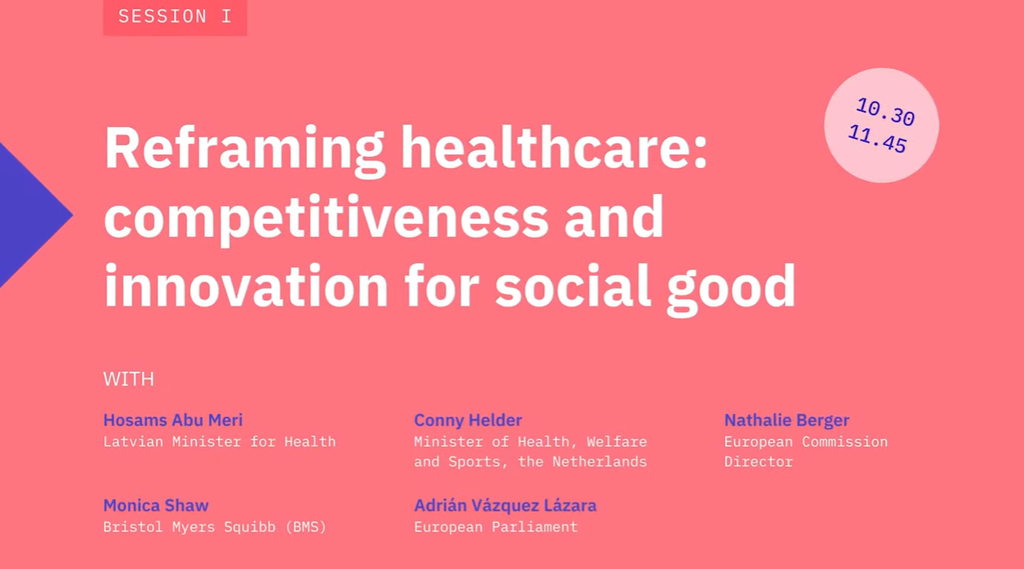Digital healthcare has taken a leap forward due to COVID-19. Since the pandemic began, 58% of countries are using telemedicine to replace face-to-face consultations. Longer-term, data and digital holds enormous potential to ensure people live longer, healthier lives. It can also bring huge economic benefits for those at the forefront of innovation. Europe needs to come together to overcome regulatory and technical hurdles. It must also build public trust by balancing privacy concerns and putting patients at the heart of the digital healthcare revolution.
“We could be the first economic area or market in the world which has an ethically-driven, ethically-sound and democratically-produced rule-base for using data, including health and welfare data,” (8:27) said Jyrki Katainen, President of The Finnish Innovation Fund Sitra, former Finnish prime minister and former European Commission vice-president. “We need some sort of health union.”
Katainen was joined by Gottfried Ludewig, Head of the Directorate-General for Digitalisation and Innovation at the German Ministry of Health and European Young Leader (EYL40), Tarja Stenvall, Senior Vice-President for General Medicines Europe at Sanofi, and contributors from local and national governments, international organisations, business, the medical community and civil society for the hour-long Friends of Europe online debate.
The pandemic opportunity
In less than a year, digital innovations like virtual consultations, patient-tracing apps and remote patient monitoring have gone from visionary ideas to day-to-day reality. COVID-19 has provided a vivid demonstration of the uses and practicalities of digital healthcare. The question now is how to maintain that momentum. How can we best create the regulatory, scientific and business environment needed to engineer a paradigm shift in the use of data? Getting digitalisation right could help save lives and maximise patient welfare.
“The pandemic has really shown the need for online data and the quick availability of it, how we can more quickly manage diseases, prevent diseases and also recognise therapeutic help for patients,” (16:30) Stenvall. “Digitalisation has become a really powerful tool for accelerating science; science will help pharma. In the end, it will help patients … it’s really, really exciting.”
15:35 Data helps industry identify new drug candidates; during the pandemic, it has helped understand new uses of existing treatments, speed up clinical trials, and provide much better targeting, monitoring and identification of safety issues. (Stenvall)
33:23 The potential of data and new individualised technology has put us at a tipping point where personalised medical health care can be based on real individual data from the past six months, rather than knowledge of past 100 years. (Ludewig)
36:46 The pandemic has made people aware that sharing data can prevent them and others from falling ill. (Stenvall)
46:30 Are we talking about utopia or dystopia? Many people fear their doctor will be replaced by a robot. (Tamsin Rose, Senior Fellow at Friends of Europe)
47:11 Technology will allow regular monitoring that gives patients better healthcare, but we need to build in accountability on the use of artificial intelligence, machine learning, etc. (Stenvall)
Building a European model
Europe is moving ahead with policy advances at the EU and national levels, such as the proposed European Health Data Space, the recommendation for a European Electronic Health Record exchange, or Germany’s new Digital Supply Act. Business is urging common regulations to create a level European playing field and boost competitiveness on world markets.
Policymakers need to craft a European model that balances the life-saving benefits of digitalisation with public concerns over privacy, healthcare de-humanisation and fear that patients’ highly personal data becomes another monetised commodity.
“Data saves lives,” (31:28) said Ludewig. “Ownership should not be monetised; the use of data for a better outcome should be monetised. This is basically the model we should come to in Europe.”
5:15 Europe needs a coherent legal framework on privacy and use of data; the General Data Protection Regulation (GDPR) is interpreted differently in member states; a common code of conduct could be a reliable solution. (Ludewig)
5:38 The joint action set up by the EU should lay the groundwork for legal technical infrastructure and to guarantee interoperability; a ‘Europe of pioneers’ is also crucial where groups of countries take the lead on key issues, such as the work of Finland, Estonia and Portugal on e-prescriptions, or the register of data on children’s oncology treatment involving Germany, Portugal and Slovenia. (Ludewig)
10:09 Privacy legislation and transparency are of the utmost importance to secure public trust so that citizens are willing to grant access to personal data. This, combined with public records enables researchers to get the big picture which can bring about a paradigm shift from curing disease to producing welfare. (Katainen)
18:47 Removing structural, legal and political barriers to European-wide data would enable Europe to compete with the US and China; policymakers and managers need to see availability of data as a real priority for driving healthcare; there is now political momentum to make data standardisation a reality. (Stenvall)
19:35 Patients have to be at the centre of healthcare; this is not just about legal and structural changes, patients need to understand the benefits of digital for longer, better-quality lives. (Stenvall)
30:32 Europe needs to come to a consensus on the use of data to save lives if it wants to inject its values into the debate on the future of medicine and data. (Ludewig)
34:30 Reimbursement systems may have to be adapted to incentivise data collection. (Ludewig)
42:30 The future of the digital healthcare system will be patient-centred, but it’s less certain that Europe will take the opportunity and lead this movement; it needs to act to create the right regulatory framework, including a better code of conduct for the GDPR. (Katainen)
The big idea
Moderator Rose concluded the debate by asking speakers for their ‘one big idea’ that’s most needed to take digital, data-driven healthcare forward in Europe. (52:53)
53:30 Europe-wide standardisation of data; it isn’t sexy, but it should be a major focus for the EU because data cannot be collected or analysed without it. (Ludewig)
54:03 The EU must have legislation governing secondary use of health data. (Katainen)
54:30 The European Medicines Agency (EMA) and other medical authorities should follow the US Food and Drug Administration (FDA) in accelerating innovation by standardising and aligning frameworks that give clear guidelines to industry on how to use data, design trials and carry out real-world evaluation. (Stenvall)












